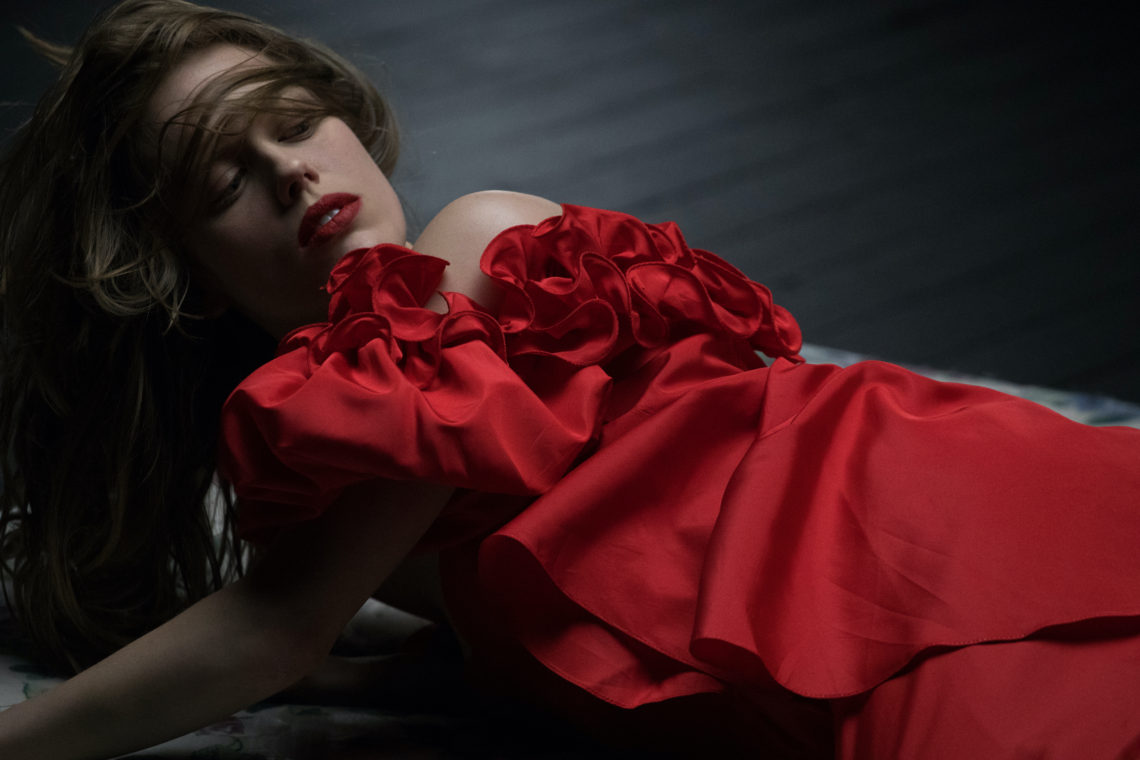
Sugar Daddy Interview: Kelly McCormack
Sugar Daddy is a film that will live with you long after the last frame.
On the surface, it is a film about a troubled young woman trying to navigate the world and break into the music industry. But the conversations within the film linger and will force you to confront ideas you may have not considered.
Screenwriter and lead actor Kelly McCormack describes the film as a ‘restless shudder.’ That uncomfortable reaction women get when looking back at our early 20s.
In the opening few scenes, you watch Darren’s complicated relationship with her mother, you see her clear vocal talent, and begin to root for this messy but compelling woman.
Sugar Daddy is a carefully spun tale. The journey of a woman searching for her voice in a world determined to make her an object. Through strong performances, captivating images, and killer music, this ‘film under duress’ is a strong exploration of the chaos of youth and the fight to reclaim your sense of self.
I spoke to Sugar Daddy writer and actor Kelly McCormack about the complicated consent you give in your 20s, financing a radical feminist film, and finding your voice as a young woman.
This interview does contain spoilers.
Sugar Daddy has its Toronto premiere tonight as part of the Canadian Film Fest at 9 p.m. ET/PT (for more information, click here) and will be opening on VOD/Digital on April 6.
Can you tell me about yourself and how you got into filmmaking?
Kelly McCormack: I had never had any interest in filmmaking, ever, I just wanted to be a theatre nerd. I trained in opera, musical theatre, experimental theatre. I moved to New York when I was twenty-one and worked in a very experimental, musical and opera space at the Flea Theatre—which is Sigourney Weaver’s bizarro, crazy Black Box theatre that does experimental new work—then the recession hit and my visa expired and I had to moved to Toronto.
Toronto’s this one city where I feel like you could do both film and theatre but you can’t necessarily do one without cross-pollinating, so I got kind of sick of the parts I was auditioning for that were written for women so I just started writing films with my friends. I had no interest or experience in filmmaking I was much marched in theatre and playwriting and then I wrote one film and then wrote a second film and then your filmmaker I guess.
Then I wrote this one after people kept asking ‘what kind of films do you make?’ and I kept saying ‘films under duress? Is that a genre?’
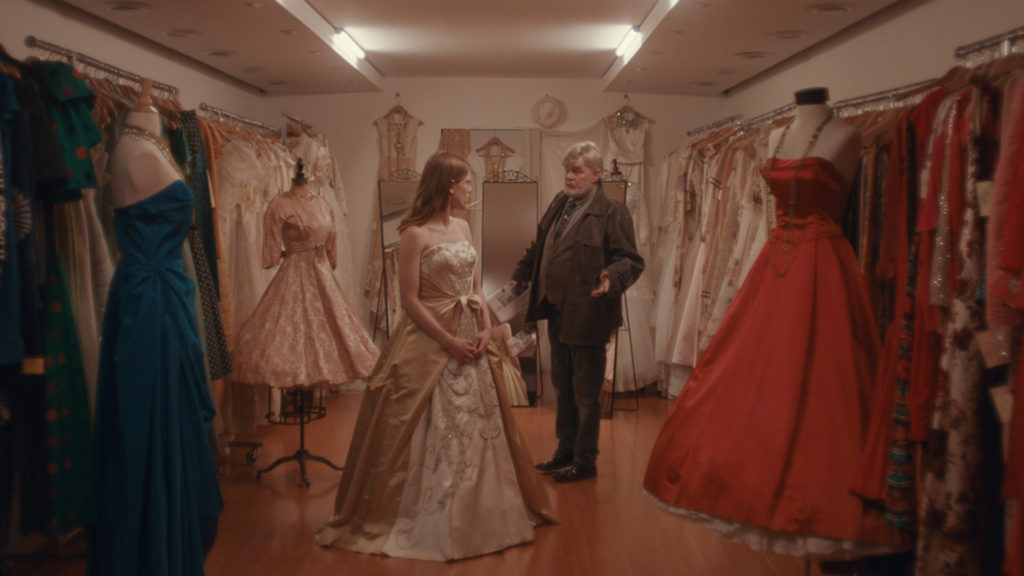
I love that, films under duress is such a great category for a lot of films coming out by women right now. I love that women are starting to talk more about women’s issues so blatantly.
KM: Yeah, that’s why a lot of the imagery that I wrote into the film from the very beginning was this like excavation, this vomiting, this bile. Not empowerment in the sort of sexy pantsuit empowered woman walking down the street but in more of a body horror kind of way because as you mentioned it is under duress. You feel like your body is being weaponized, attacked all those things and so when you’re talking about abortion or menopause or miscarriages or sexual assault, I feel I see so much imagery.
I think hopefully it will resonate with women watching it where they’re like ‘yeah that feels right.’ That’s all I know care about. But now that people are finally like ‘we want women stories’ it’s like they do feel like [makes vomit noise], under duress. You’re all just going ‘all right I guess we should maybe put words to this monstrous feeling.’
In your writer’s note, you mentioned that this film is like a laugh and shudder that women have in their 20s. I definitely resonated with that in my 20s, and I wonder how you brought that out and achieved that so well.
KM: I wrote this film five years ago and I was just I feel like twenty-five is a big transition. I feel like that’s when adolescence sort of ends, truly, and then you start going ‘Okay I’m an adult now.’ When the film was written I had all these part-time jobs, I was so broke, I was so angry. It came from a place of rage, and this was before #MeToo, so I felt like I needed to say some stuff that wasn’t publicly being talked about.
So I locked myself in my room, in my one-room apartment, and wrote this in about three months. We did lots of revisions in the five years after that moment but I think I was an age, and sort of still am, where I was looking at decisions I made in my early twenties and every time I ask women about the early 20s they’re usually drinking its sort of like [shudders], this sort of ‘ugh God yeah.’
Especially the things that I said yes to that I consented to, the moments where I was like ‘did I just, did he just, did we just,’ and especially the concepts like the blow away and things like the blowjob you give to get a guy to go away, that’s a conversation my best friend and I had over a date that she had. It is that shudder, that that sort of space that women understand that has been up to this point unspeakable and monstrous and grotesque. We all can relate to the feeling of [shudders].
We’re only now getting the ability to put words to that. So anytime I was writing the film and I felt like I was losing my footing or not sure what this was, I would just think about that. I hope that’s what the feeling of the film in its entirety gives, the impression of a restless shudder.
On the topic of consent, I feel like the sex-work aspect of the film, in her job, consent there is…interesting. When Darren and Gordon do actually have sex it felt like it wasn’t part of her work, to her, but it was for him and that makes it not consent? I could be wrong.
KM: No, the confusion and the disorientation you feel around that moment was what I wanted. The film isn’t about sex work or sex workers. It’s not representing sex workers, it’s sort of representing all the other ways, excluding overt sex work, that we are commodified in there are these exchanges.
So at the end of the film, did she get paid for sex? Yes. Did she also get a scholarship? Yes. Did she want to sleep with him? Yes. Would she have wanted to sleep with him knowing that he was gonna pay her? Maybe no.
I’m trying to capture those moments, at least from my life, where I think every woman can relate to. If a guy wants to take you out for dinner and wants to pay for that there is a sexual expectation. I have friends who have been like ‘this guy wants to take me to New York on this trip and wants to pay for everything,’ but then it’s the question of well if you go, are you consenting to the sexual expectation behind that? It’s sort of about the questions of consent that are unspoken and that women, I think, understand is like a math equation but we just don’t get a chance to talk about it.
I think Gordon definitely does believe in her career and did want to give that money, but also he’s a man who has incredible affluence and he’s used to paying things to make them sort of go away. So he is paying her for sex but he also does think she wants it. I wanted everyone to leave the theatre arguing, that was my biggest regret of COVID, that I’m missing people argue in real-time.
Hopefully, one day.
KM: Hopefully when they release a 16mm or they’ll do some sort of weird retrospective, I’ll be 100 years old and but like ‘I don’t know what this movie’s about, I wrote it when I was so young.’
That brings it back to the one part in the film where they’re all talking, all these very ‘liberal’ people discussing prostitution and sex work and this confusion with consent. It was interesting to watch this very diverse group of people with kind of similar but different views discussing these topics. Can you talk about how that all came to be what it was like filming with the actors?
KM: Yeah, because I come from theatre all my films have a really large dinner scene smack dab in the middle of the film because that such a theatre device to get all the main characters and all the opposing feelings together in one room. That fourteen-page dinner scene was in the first draft of the film and pretty much went unchanged. We changed so much in the film but that really stayed the same.
I wanted to hear other women’s perspectives on what Darren was doing and sort of hang Darren’s privilege out to dry. You’ll notice that she doesn’t really talk that much when the conversation gets going and the men sort of disappear. In the edit we were very conscious of the shortages, literally, you do not see them anymore and it’s just a female reactions.
I knew that people that I wanted to cast in those roles, some of them are written, like my costume designer Mara Zigler who plays Maya. Kaniehtiio Horn, as an Indigenous woman, was really excited about the idea of portraying an Indigenous woman as she experiences it, which is just hanging out with a bunch of people someone says something that she has to be like ‘fuck, I have to now say something and represent.’ She’s always being cast in parts—or rather feels she has the privilege to portray and represent a lot of the horrors that Indigenous woman are enduring or have endured. But in this film, she just got to be herself at a party where she has call out someone and call out someone’s privilege.
It was very important that each one of them felt like they could represent their opinions but they weren’t right, and they weren’t wrong, and its kind of like where you fall on the conversation is really the sum of its parts. It’s really about the conversation, not about one person coming out on top.
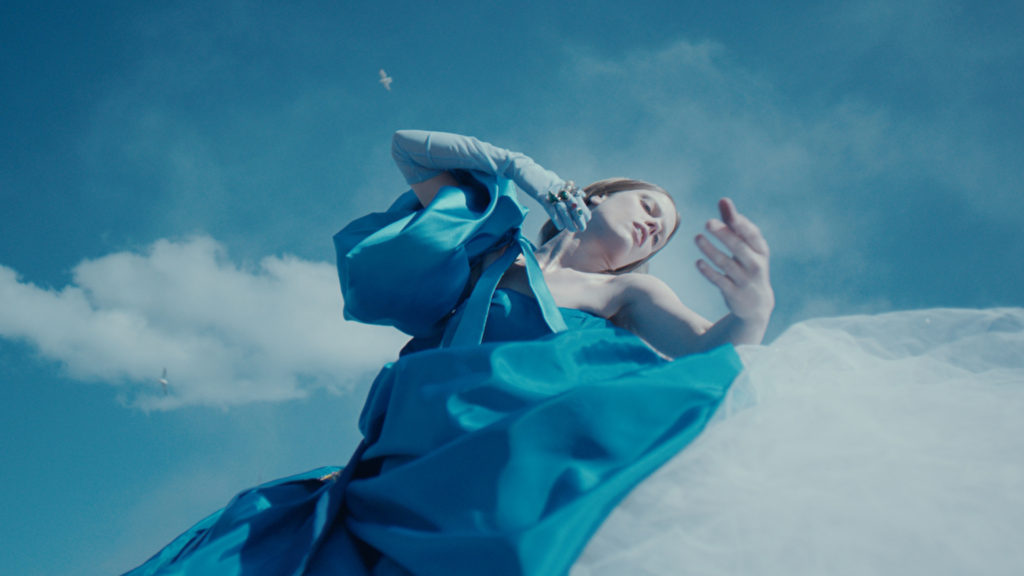
I love that that was directly followed by the ‘friendzone’ conversation because he was in the room while these women were having this discussion.
KM: It’s funny because so many men would read the script, in early drafts, and be like why is Darren so mean to Peter, he’s such a nice guy and then women would read it being like ‘oh my God Peter, what asshole.’
And it’s that, I wanted none of the male characters to come across is just like one-dimensional creepy guys and here’s a guy who I want the audience to root for in the beginning of the film and be like ‘you should be with him, he’s great,’ because that’s how all the romantic movies in the 90s start. You meet the nerd and then you meet the Colm Feore character and you’re like ‘you should be with the nerd.’
She’s going on these paid dates with men and she’s finding more intimacy and she’s more herself with the Gordon character. But it’s her roommate, who should be the one that she feels safe with, who is commodifying her just as much as these older men and the fact that he has just listened to this whole conversation and then been like ‘now is the time for me to expect that you hook up with me.’
It’s all about you know male fragility and his insecurities and him trying to, you know, in him being drunk and not sure how to put words to his feelings. That whole section is still so hard to watch, and I think a lot of women have been in that position before.
I was a little worried when it got to the part where you find out that her sister and Peter had sex because I got this feeling like ‘oh no, don’t have this be her realisation that she loves him.’ But it was actually just ‘what the fuck?’ I thought that was really well played.
KM: Again sort of trying to play into Darren’s flaws where she’s willing to go down this rabbit hole but she doesn’t want her sister to do it and she also has an expectation of liking the fact that Peter likes her and that’s hers. That’s her ownership and she doesn’t want her sister to have that.
It’s also playing into the ways in which the flaws in Darren and the in the ways in which she also is culpable in certain situations. She knows she knows that Peter likes her, she knows that, and she wants him to pay for her rent, and she wants him to make her dinner. And does that make her an asshole? Yeah, maybe but is that more real to what it feels like? I want to make it real and not men are bad and women are this, even though men are bad, mostly.
I think it also plays into this safety thing where you know she is being nice because she likes it, but it’s also like what will happen if I turn down?
KM: 100% and it’s that sort of ‘you lead me on, you were nice to me,’ where men accuse women of taking advantage of their interest in them. And it’s like what is our alternative? It’s like when you walk down the street and a guy says ‘hey smile’ and you can literally only smile because if you do anything else are you give them a ‘hey,’ because what your thinking about is your own safety. Is this guy gonna get up and punch me in the face? It’s a real thing and then if you smile at them and then they do advance on you is it like ‘well you smiled at me.’
It’s all that and it’s true that she knows Peter likes her, and she doesn’t have anywhere else to stay and if she does come out and say well ‘I’m not interested,’ that will drastically change her living situation. And that’s on Peter, that’s not on her. Peter would be the asshole.
I think the safety aspect here paired with her job where at one point she realises they’re in the middle of nowhere and she’s put herself in a situation that she thought was safe but might not be. Along with the earlier sex work conversation about how dangerous that can be with the privilege of being white and not really realising what situations are dangerous.
KM: That’s sort of what I wanted to tap into with Kaniehtiio Horn’s line ‘Women from the Rez don’t survive that line work,’ because it’s like even stepping into these situations it’s not some sort of female empowerment, ‘I can just be get paid for sex,’ the very function of this can result in death.
Darren is both not only privileged because she’s white but is also just stupid and young and the amount of times I can think where I look back and can’t believe I got that person’s car and just sort of shutter. Because that’s what that is. It was important that this journey didn’t feel like Hustlers, it didn’t feel like this fun empowering thing, it was these moments of danger.
Then she does get in a car with a sugar daddy near the end of the film because she’s sort of gotten to a place where she thinks she’s handling it. She’s drinking at the club because Peter has just told her he needs more money so she’s like ‘F you’ I’ll go do my thing. Then the man is crying so she sort of helps him out and then he assaults her and she falls out of the car and instead of her going home emotionally handling that, she handles it in a way that I think a lot of young women can relate to which is ‘shit, I’m on drugs, I’m out and this really scary thing has happened, let me call this person who I really want to like me so I can feel good about myself.’
It’s all those moments, again the shudder, the moments aren’t slowed down enough for you to unpack them and then you look back your life and wish ‘I didn’t remember that.’
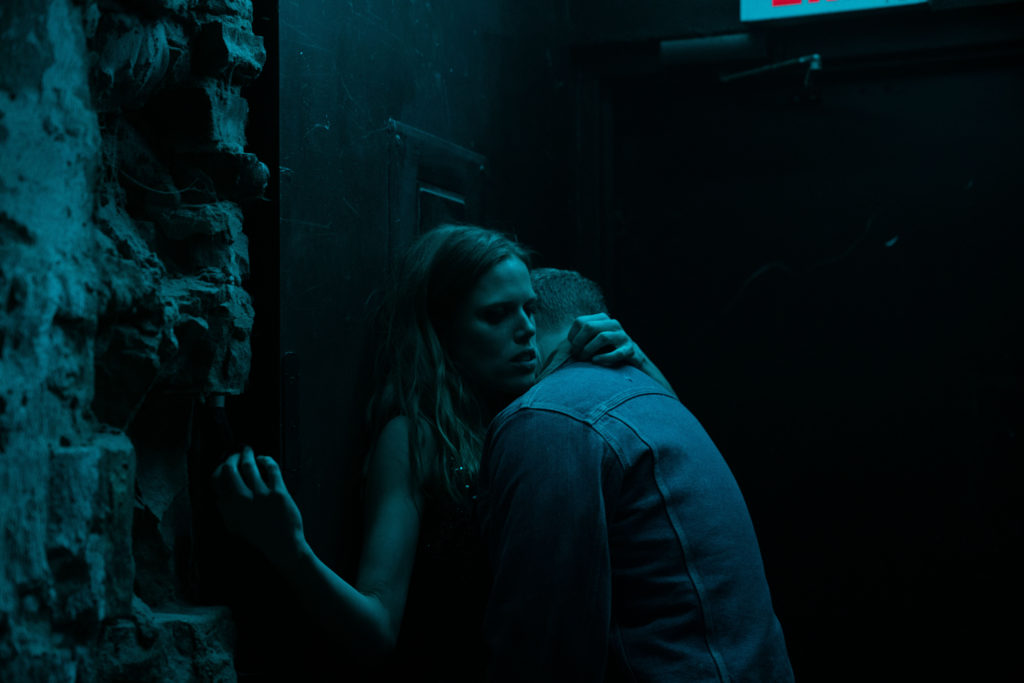
Finding your voice and like being a young person, going back to the conversation in the group where someone mentions that when a woman goes on a date her boyfriend is worried because he’s losing her as an object, where the other way around she’s worried that he is going to cheat. And then you look at it through the eyes of her going to become a singer and she’s putting herself into an industry where she will be viewed as a product, how are you supposed to find your voice in these situations where only view as a thing?
KM: That part happens really fast but I think when women are watching it, they pick up what Khadijah Roberts-Abdullah is saying, which is that when you go out with a guy, he is worried that other men will view that women as some other man’s object.
I think when talking about artists and musicians, the male musicians come out of the industry as a subject, a subject of art, and women come out as an object of art and subjectivity is something that is a kind of a recurring theme in my work and I think about and also in my studies and what I write about.
How does a woman access auteurism? Or going from objectivity to subjectivity in a world where the view of women is constantly objectified?
One of the ways we try to hack that was in a lot of costume design. How do we show Darren in her music persona? I really wanted this idea of Darren being bare and bare-chested because Iggy Pop, Freddie Mercury, David Bowie, all these rockstar’s at one point take off their shirt and they’re sweating on stage bearing themselves to the world. We can’t do that as women but we were like ‘how we show Darren nude and in her own skin and it not be objectified through the lens of the film industry?’ Even if you show women naked on stage and it’s directed by women, shot by women, for woman, it’s still in the Hollywood machine of female nudity and is objectification.
You’ll notice that like when she’s having intimacy with Gordon, she’s in a nude t-shirt. When she’s having intimacy with Angus she’s clothed. It’s only when she’s alone with herself is she naked because I wanted to somehow hack how you have women and nudity and sell it as subject as opposed to object.
That conversation is a constant and was a constant ongoing one and I believe that the film sort of ends where Darren’s career starts. So how she enters into the industry with this like one glove and nakedness and spitting ink, I don’t know? But that is how I think the world would, if this world actually existed, would first meet her.
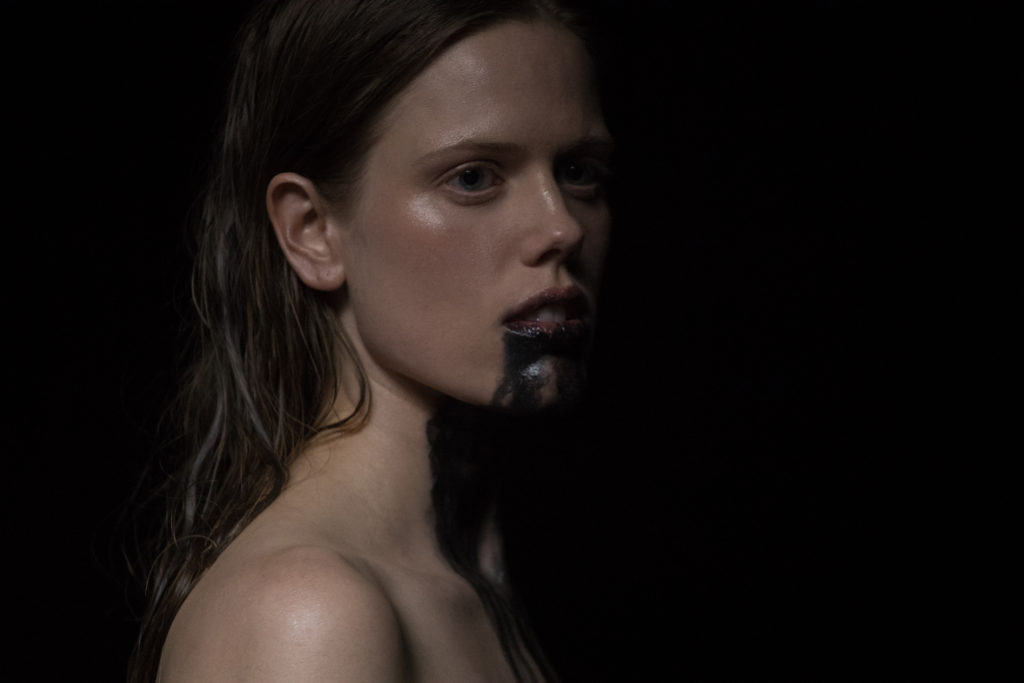
There’s a bit in your writer’s note about how difficult it was getting financing. It’s something I hear a lot, especially from Canadian women, can you talk about what that’s like?
KM: There is a lot of talk about the need for female directors and female writers but there is not a lot of talk about the need for female financiers. I’ve never met a female financier in film, there are tons of female financiers in theatre, in opera, in arts organisations, in festivals and in many other arts philanthropy there are tons of women involved. Really really cool, empowered women are financing art in a way.
In the film industry, the finance industry’s very much a boys club. So asking, when you have a financing gap in your budget, asking a man sitting across from man pitching a film, my film, as myself, playing myself, to a very old, rich man felt very meta because asking them to finance and take a risk on the films already know such a huge ask because investing in films is very tenuous. Telling them the film investigates the power dynamics between men and women when one is a position of power, money and one’s position as an artist is a whole other thing.
It’s difficult for women in the industry because you’re asking them to cosign on such radical feminist material in such material that may challenge their very existence and their very way of living life and their older held beliefs. If I got told by a couple of financiers ‘you know if you want to do a boxing movie, or a sports movie or a war movie that would be great.’ I got told by a financier that he didn’t want to invest in this film because he was worried that people would think he was a sugar daddy, even though I was having a meeting with him just like any other.
Unpacking that is like…how do you even unpack that?
You can file this under all the things that male filmmakers don’t need to do deal with. they don’t need to consider what they’re wearing to a meeting just so that the person will understand this is not a date. They don’t need to think about if I feel like I want to wear something more feminine, I don’t want to pretend to be someone I am not, how is that gonna be commodified and how does the rest of the industry think about me when I’m sitting across from this older man who has a lot of money.
I’m just so sick of being told by other female filmmakers ‘you know wear a turtleneck with that one.’ It’s this kind of network of safety, a network of women who have been keeping each other safe for so long and instead we should be dismantling these peoples positions of power and getting more women into the fold in the financing world.
I started drinking a lot more wine in my life after trying to finance this film. I do consider thinking of making a sports movie next, a feminist sports movie, but I’m sorta like, you know, maybe.
What are you up to next?
KM: The League Of Their Own is shooting this summer. I have my next feature film is a Sci-Fi-esque film about an immortal woman and it’s gonna be feminist in nature but sort of a big Sci-Fi movie, but not too genre-y. I have a TV show that’s called The Blow Away that I am working with a really rad producer on and that hopefully will get going soon and I have also another TV show them working on that is actually kind of a show about war but from a very different perspective.
I just noticed have a Portrait Of A Lady On Fire poster behind you not sure you saw but our poster for the film was painted by the woman by Hélène Delmaire who painted all the portraits in Portrait Of A Lady On Fire.
What?! How did that come about?
KM: I sent her a very, from the heart hail mary email because some of her paintings before she did Portrait Of A Lady On Fire, some of her paintings were in early lookbooks for the film. So I had this vision for the poster and I reached out to her and she watched the film and she really related to it and I was like ‘your imagery, your paintings were like part of our inspiration for the tension, the rage in the classic portraiture way we shot the film.’ So I reached out to her and she agreed and she painted the portrait of me and I still can’t believe it.

